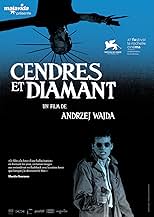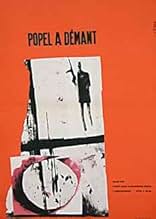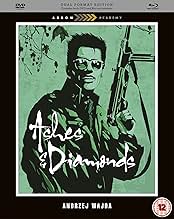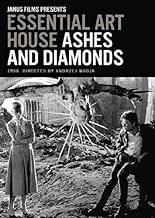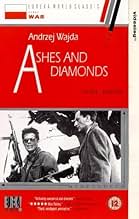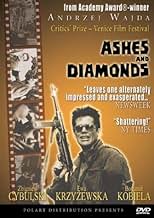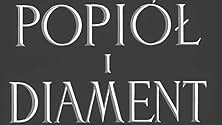Während der deutschen Besatzung lebten Adlige, Bürgerliche und Arbeiter friedlich miteinander. Am ersten Tag ihrer Freiheit beginnen sie, einander zu bekämpfen. In diesen Kämpfen entspinnt s... Alles lesenWährend der deutschen Besatzung lebten Adlige, Bürgerliche und Arbeiter friedlich miteinander. Am ersten Tag ihrer Freiheit beginnen sie, einander zu bekämpfen. In diesen Kämpfen entspinnt sich eine zarte Liebesgeschichte.Während der deutschen Besatzung lebten Adlige, Bürgerliche und Arbeiter friedlich miteinander. Am ersten Tag ihrer Freiheit beginnen sie, einander zu bekämpfen. In diesen Kämpfen entspinnt sich eine zarte Liebesgeschichte.
- Nominiert für 2 BAFTA Awards
- 1 Gewinn & 2 Nominierungen insgesamt
- Stefka
- (as Barbara Kraftówna)
- Barmaid Lili
- (as Z. Czerwinska)
- Franek Pawlicki
- (as W. Grotowicz)
- Jurgieluszka
- (as I. Orzewska)
- Smolarski
- (as M. Loza)
- Puciatycka
- (as H. Siekierko)
Empfohlene Bewertungen
It's really the way how this movie looks that made this an interesting and good watch for me. It features some beautiful black & white cinematography and it has some some really strong and unforgettable images in it.
The story in itself is being kept deliberately small and simple. The movie very rarely dwells, which is a good thing but it at the same time also prevents this movie from making a truly lasting impression with a good or powerful story. In my opinion the movie was lacking this, which prevented me from truly regarding this movie as a perfect movie, or a must-see classic, even though it is generally being regarded as perhaps the best and most definitive Polish movie ever made.
Neverhteless, the characters all do work out well, due to the movie its story and overall approach. It was also truly a pleasure to watch Zbigniew Cybulski act, who is known as the Polish James Dean. He was truly great and really solely carried the movie, for most part.
Due to the fact that the movie is being kept simple and small, there is also very little to indicate in this movie that it's actually one being set during WW II. Don't know whether this was done intentionally or not but anyway, I liked that about this movie. It's a war movie without the war and everything that goes along with that and basically all that ever indicates that there is war going on is shown by the presence of a few soldiers.
A solid but above all things beautifully directed movie, by Andrzej Wajda.
8/10
http://bobafett1138.blogspot.com/
1. Nothing is black or white, everything is just a shade of gray
2. Is death, no matter how you try to justify it, senseless?
3. Is it better to live, while on your knees or die standing straight? Or maybe it's better to try to live standing straight?
4. That sometimes it's not war that is hell, it's living through war and trying to live a normal life that is a lot harder (thank God I do not know if it is so)
Wajda's movie doesn't give direct answers to any of these questions - each person may watch the movie from a different point of view and get to a totally different conclusion. But even if you're not into psychological movies about war, or noir-movies (and Popiol i Diament is definitely a sort of a noir-movie) it's worth watching for just one scene - the burning vodka glasses at the bar - Cybulski at his best.
And lastly - the motto of the movie (and of the book as well):
"Will ash and chaos be left in the end, that follows a storm into abyss Or may a diamond be found in the ash, a dawn of an everlasting victory"
Cyprian Kamil Norwid
PS: I hope Mr Norwid will not turn in his grave at the quality of my translation but that part of a poem by CK Norwid sums up the movie really well.
Wusstest du schon
- WissenswertesCitizen Kane (1941) - and Gregg Toland's cinematography in particular - was a huge influence on Andrzej Wajda at the time. Like Toland, the first thing the film's cinematographer Jerzy Wójcik did was convince production designer Roman Mann to include ceilings in all the sets.
- PatzerGlasses of vodka are set alight which burn for an unnaturally long length of time and with a bigger flame than expected, suggesting a purer fuel was used in the film, such as petrol. Moreover, when the final flame dies (c.41 minutes) no liquid remains in the glass. Only the alcohol content is flammable in any glass of spirit and a residue of water would be left behind with even the very strongest of Polish vodkas.
- Zitate
Krystyna: Look. An old crypt. An inscription. "So often are you as a blazing torch with flames of burning hemp falling about you flaming, you know not if the flames bring freedom or death, consuming all that you most cherish. Will only ashes remain, and chaos whirling into the void." The letters are blurred. I can't read it.
Maciek Chelmicki: It's by Norwid. "Or will the ashes hold the glory of a starlike diamond, the Morning Star of everlasting triumph."
Krystyna: That's beautiful. "Or will the ashes hold the glory of a starlike diamond..." And what are we?
Maciek Chelmicki: You - are definitely a diamond.
- VerbindungenEdited into CzechMate: In Search of Jirí Menzel (2018)
- SoundtracksCzerwone maki
(Red Poppies) (uncredited)
Music by Alfred Schütz and lyrics by Feliks Konarski
Performed by Grazyna Staniszewska
Top-Auswahl
- How long is Ashes and Diamonds?Powered by Alexa
Details
Box Office
- Budget
- 6.070.000 PLN (geschätzt)
- Laufzeit1 Stunde 43 Minuten
- Farbe
- Sound-Mix
- Seitenverhältnis
- 1.66 : 1
Zu dieser Seite beitragen


